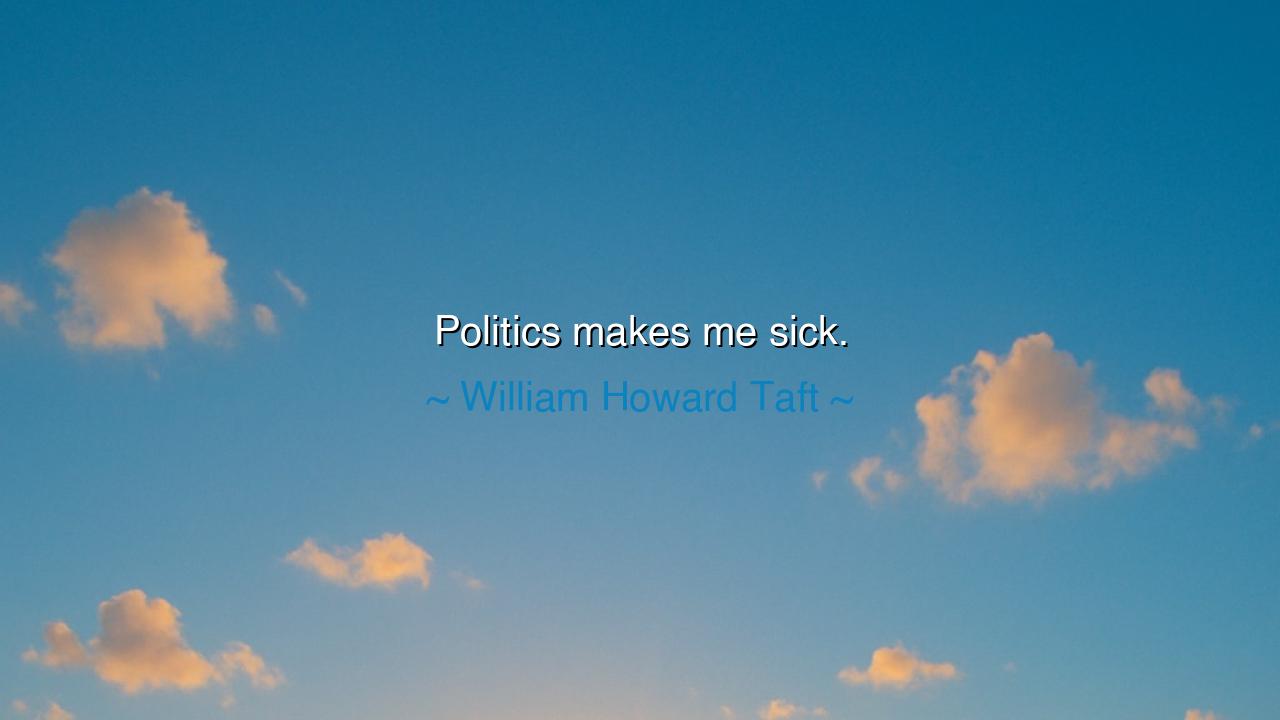
Politics makes me sick.






The words of William Howard Taft — “Politics makes me sick.” — rise not as the cry of a cynic, but as the weary confession of a man burdened by the weight of public life. Taft, who served as both President of the United States and later as Chief Justice, was not without love for service, nor without a sense of duty. Yet he spoke these words to reveal the corruption, the endless quarrels, and the hollow ambitions that too often stained the realm of politics. For in its ceaseless struggle for power, he saw little of the purity of governance, and much of the sickness of pride.
The meaning here is simple yet profound: politics, though meant to serve the common good, often descends into intrigue, betrayal, and division. For Taft, who longed for the clarity of law and the impartiality of justice, the mud of politics was unbearable. He was a man who sought order and truth, and thus the compromises, manipulations, and rivalries of the political stage brought him anguish. His words are not a rejection of duty, but a lament for the state of a system that should have been noble, yet was sullied by human weakness.
History offers many examples of such disillusionment. Consider Cincinnatus, the Roman farmer called to serve as dictator in a time of crisis. He fulfilled his duty, then cast aside power and returned to his plow, unwilling to be mired in the intrigues of Roman politics. Like Taft, he understood that service may ennoble, but politics often corrupts, and that to remain untainted one must not cling to power for its own sake. Their stories reveal the eternal struggle between governance as service and politics as ambition.
The origin of Taft’s words lies in his own temperament. Unlike Roosevelt, his fiery predecessor, Taft was not driven by combativeness but by reason. He preferred the bench to the battlefield of legislation, the rule of law to the game of alliances. Politics for him was not invigorating but draining, not honorable but exhausting. And so, in truth and with no veil, he declared: “Politics makes me sick.”
Therefore, O seekers of wisdom, take this lesson: to enter politics is to walk a road strewn with both duty and danger. Some thrive in its storms, others are undone by its poison. Yet the noble heart must remember, as Taft reminds us, that the true goal is not the scramble for power, but the service of justice and the welfare of the people. Let his lament be a warning: that when politics ceases to serve the good, it becomes sickness — but when wedded to honor, it may yet become the cure.






QD2 quoc doanh
Taft’s comment about politics making him sick is relatable in many ways. Politics today often feels more about posturing and personal gain than about solving real-world problems. What would it take for people to feel that politics is more about progress and less about manipulation? Is it possible for politicians to restore public trust and show that they care about the greater good rather than just their own agendas?
DKTran Pham Dang Khoa
It’s hard to blame Taft for feeling sick of politics when it seems like it’s all about conflict and power struggles rather than making real change. But this raises a bigger question: Can politics ever be something that people actually look forward to and believe in? Could we create a political system where those in power truly serve the public’s interests, or is this just an unrealistic ideal?
GGshoot431
This quote makes me reflect on how draining politics can be, especially when you're constantly bombarded with negativity and scandals. Perhaps Taft was feeling the same frustrations we see today—where politics seems like a game of power rather than a means to improve society. Does this mean that those in power should be more transparent and focus on the people they serve, or is this just an inherent flaw in the system?
HBLe huynh bon
When I read this quote, I immediately think about how politics today often feels overwhelming and exhausting. It seems like there’s more focus on drama and spectacle than on real progress. How much of Taft’s sentiment is still relevant today, especially with the divisiveness we see in global politics? Is it possible to have a system where politics isn’t so exhausting and disheartening?
VDVan Doan
It’s interesting to hear such a blunt sentiment from someone who was so deeply involved in politics. I can’t help but wonder if Taft’s frustration with politics came from the dysfunction and gridlock he witnessed during his time. Does anyone in politics today feel the same way? Is the system itself so broken that even the people in charge lose faith in it? What would it take for politics to be less of a burden?